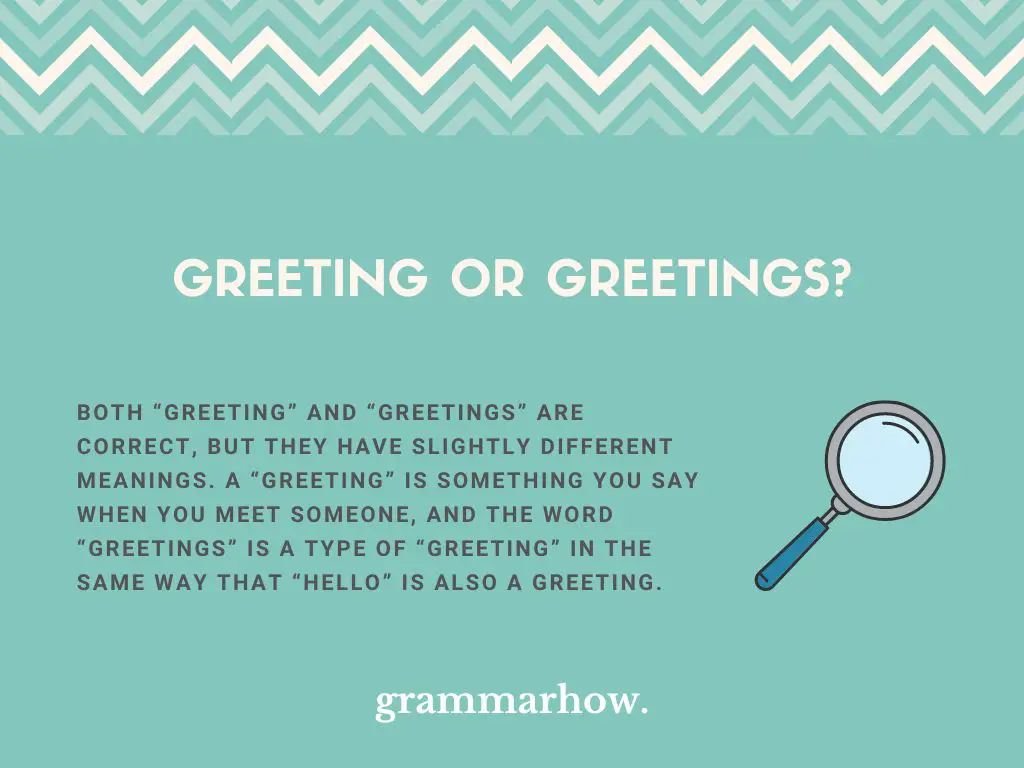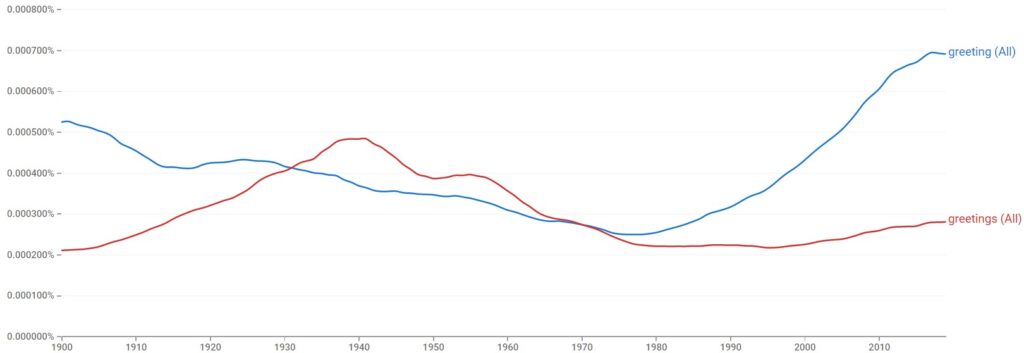It is sometimes difficult to fully grasp how to use the terms “greetings” and “greeting.” This article looks at each word in detail and breaks down exactly how to use them correctly in a sentence.
Greeting or Greetings?
Both “greeting” and “greetings” are correct, but they have slightly different meanings. A “greeting” is something you say when you meet someone, and the word “greetings” is a type of “greeting” in the same way that “hello” is also a greeting.

The word “greeting” is in the Cambridge Dictionary as something you say to someone when you meet or see somebody, or you can also send a “greeting” via message or card.
The plural of the word “greeting” is “greetings”, and some popular “greetings” include:
- Hello
- Good morning/afternoon
- Greetings – Please note that when offering your “greetings” to someone, the word is always used in the plural rather than in the singular. However, when discussing the act of sending a “greeting”, the term can be used in singular and plural.
Here are some examples of “greeting” and “greetings” in a sentence:
- My Dad couldn’t come, but he sent you his greetings.
- The boy mumbled a greeting that nobody could hear nor understand.
- I greeted her on the stairs, but she didn’t respond to my greeting.
- She put her hand out as a greeting, but the other girl just walked off.
- They quickly exchanged greetings before ignoring each other for the rest of the meeting.
Greeting or Greetings in Email?
The word “greetings” is a typical “greeting” that is used in letters and emails as a shortened form of saying “I send you my greetings.”
It is common to see the phrase at both the start and end of an email or letter. However, it is somewhat informal, so you may only choose to include it when you know the person you are addressing. As a result, sending it to someone you don’t know in an email may be a little inappropriate for some people.
Greeting
The word “greeting” is defined in the Cambridge Dictionary as something you say when you see or meet somebody, or as a message of good wishes, often sent on special occasions like Christmas and birthdays.
The word can be singular or plural; however, when you are “greeting” somebody, and you are only saying one word, i.e. “greeting” or “greetings”, you would not use the singular version, and instead, you would say “greetings”.
For example, on somebody’s birthday, you could say:
- Greetings on your birthday, NOT Greeting on your birthday.
- Sending you big birthday greetings.
- Sending you a big birthday greeting.
If you were responding to somebody sending you birthday “greetings,” you could say something like:
- Thanks for the birthday greetings.
- Thanks for the birthday greeting.
Or as a verb:
- Thanks for greeting me on my birthday.
Here are some more examples of “greeting” in a sentence:
- He gave her a rather rude greeting and then walked off.
- In some parts of the world, bowing is a more common greeting than a handshake.
- The man didn’t acknowledge my greeting and instead just completely ignored me.
- The old man moved his head slightly, which was his way of offering a greeting.
Greetings
The word “greetings” has two primary functions, but they can cause a little confusion because the word “greetings” is a type of “greeting”, so it is essentially the same word as the name of the word class that it is found in.
When you are offering “greetings” as a one-word utterance, commonly used at Christmas or birthdays, you would always use the plural version “greetings” and not “greeting.”
Even when writing a longer message of “greetings”, it would be uncommon to use the singular version. However, if you are referring to the act of “greeting” someone, it is common to use the singular version of “greeting.”
Here are some examples of “greetings” in a sentence:
- Greetings to you on your birthday.
- I am sending festive greetings to you and your family this Christmas.
- Greetings can vary from country to country.
- They traded greetings before starting the game.
- Greetings were briefly exchanged, and then both women went their separate ways.
- Thanks for the greetings you sent on my birthday.
- Wishing you birthday greetings.
Which Is Used the Most?
The Google Ngram shows that at the start of the 20th century, the word “greeting” was more common than “greetings.”

From the 1930s to the 1970s, “greetings” then became more popular than “greeting”; however, since the 1970s “, greeting” has grown in frequency and is now considerably more common than “greetings.”
Final Thoughts
The word “greetings” is used as a single-word “greeting” to offer somebody good wishes on a special occasion or as an alternative way of saying “hello.” When used as a “greeting”, the word is always “plural”; however, when discussing “the greeting”, it is possible to use singular and plural.

Martin holds a Master’s degree in Finance and International Business. He has six years of experience in professional communication with clients, executives, and colleagues. Furthermore, he has teaching experience from Aarhus University. Martin has been featured as an expert in communication and teaching on Forbes and Shopify. Read more about Martin here.
